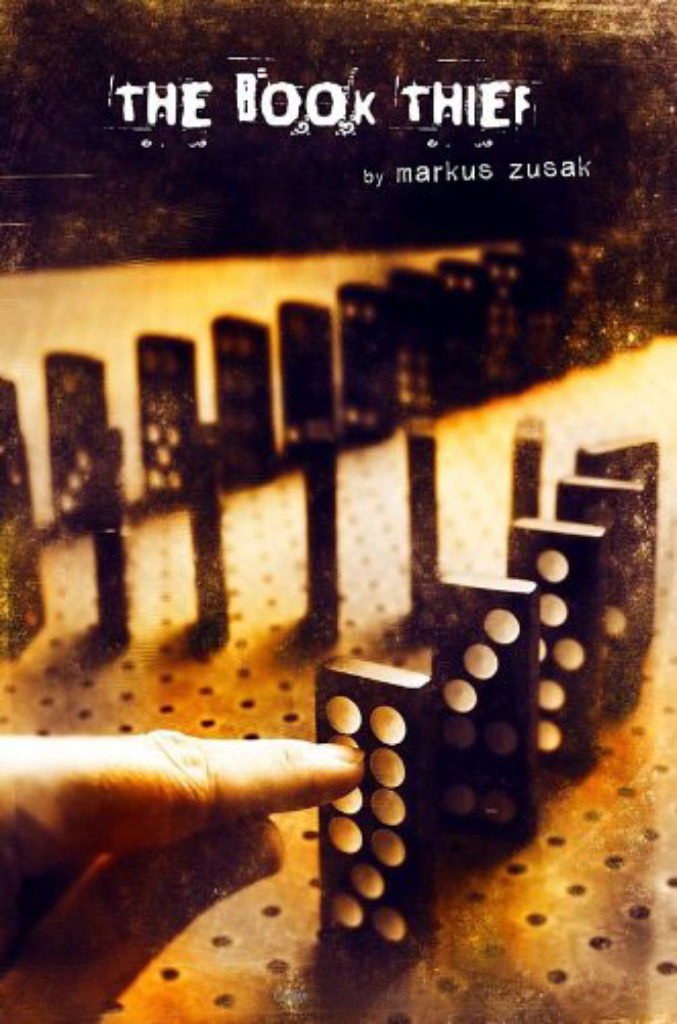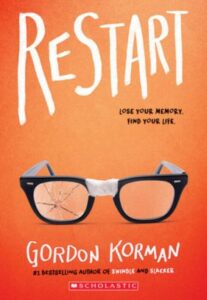Death, the narrator of this book, first meets Liesel Meminger in 1939 as she, her little brother and her mother travel on a train. Death has come to take the soul of her sick brother. Although few humans interest him enough to stay nearby once his task is done, 9-year-old Liesel intrigues him. He watches as she mourns at her brother’s graveside and steals a book that falls from a gravedigger’s pocket. It is through Death’s words that we become voyeurs into Liesel’s life over the next four years.
Liesel’s mother accompanies her to a foster home in Molching, Germany, where she gives the girl into the care of Hans Hubermann, a housepainter, and his wife, Rosa. Grieving the death of her brother and the loss of her mother, Liesel takes time to adapt to her new surroundings. It is Hans’ gentle care and accordion playing that eventually softens the girl’s heart. She ultimately comes to call Hans and Rosa Papa and Mama. Hans discovers Liesel’s first literary theft, The Gravedigger’s Handbook, under her mattress. He uses it to help her improve her reading.
Liesel’s days are spent struggling to catch up in school, playing soccer with Rudy Steiner (her best friend) and the other children in her neighborhood, helping Rosa deliver laundry to her customers throughout Molching and reading with Hans at night when recurring nightmares wake her. Two years later, when the local Nazi party sponsors a book burning, Liesel steals her second book from the smoldering pile of banned stories. When Hans discovers the book, he doesn’t punish her. Instead he promises to keep her secret if she promises to keep his secrets.
Their quiet life is altered when Max Vandenburg arrives and asks if Hans still plays the accordion. Max is the son of Erik Vandenburg, who served in the same company as Hans during Word War I. Erik was a Jewish musician who brought an accordion with him and taught Hans how to play. Erik also volunteered Hans to stay behind from battle one day in order to help a captain write some letters. The rest of the platoon was killed. The only reminder Hans has of his friend is the accordion he left behind.
After the war, Hans visited Erik’s widow and vowed to help her if ever she needed anything. Years later, Erik’s son Max, weary and tired from months of hiding from the Nazi party, arrives at Hans’ door to see if Hans will keep his word.
Despite the danger, Hans and Rosa take in Max, arranging a hiding place for him in their basement behind paint cans. The only time Hans speaks harshly to Liesel is when he explains the need for her absolute silence regarding their houseguest. She may not tell anyone, not even her best friend, Rudy, about Max, or her foster parents will be taken away and she would have to live with a new family. Liesel agrees. At first she is frightened of the young man who only comes out of the basement at night; but eventually Liesel learns that she and Max have much in common.
Both have lost their families, both owe their lives to the Hubermanns and both suffer recurring nightmares. As a thank you for Liesel’s kindness, Max takes the pages of Mein Kampf, ironically the book in which he hid the train tickets that brought him to Molching, and paints the pages. He uses paint to tell his story, a story of a frightened man who finds friendship and acceptance from a young girl. He gives the book to Liesel as a belated birthday present.
Liesel continues to keep their Jewish houseguest a secret from her friends. She also keeps aspects of her “outside” life secret from her family. She and Rudy have gone with some older boys to steal fruit from a local orchard. The act of thievery not only alleviates their hunger, but also gives a sense of control in a world that seems to be spinning into chaos.
Liesel also has developed a friendship, of sorts, with the mayor’s wife, Mrs. Hermann. She is a silent woman, who still grieves the loss of her only child. When Liesel goes to the mayor’s house to pick up and deliver the laundry, his wife allows the girl to visit their library and read their books.
After the mayor fires Rosa, Liesel and Rudy decide to break into the house and steal from them. Rudy wants Liesel to steal food and cigarettes, but Liesel only takes a book from the library, falsely claiming that she heard someone coming down the stairs before she could steal more. They visit the house several more times, and Liesel comes to realize the mayor’s wife knows of their thievery, to the point that she actually aids them by leaving the library window open and cookies on the mayor’s desk.
One day, as Liesel is outside playing soccer with the neighborhood children, she sees Nazi officers knocking on doors and entering houses. They are searching basements, looking for possible air raid shelters because the Allied bombings are coming closer. Liesel fears if they go into her basement, they will find Max. She makes a spectacular save as goalie so that she can fall and cut her knee, giving her an excuse to go home and warn her family. But even with her bravery, there is no time to hide Max. As the officers measure the basement, the family waits in terror. To their astonishment, their simple wall of old paint cans and a tarp keep Max hidden from view. Their basement is deemed too shallow for an air raid shelter, and the Nazis move on.
As the war nears Molching, air raid sirens often wake the family. Unable to bring Max to safety, they have to leave him behind while they go down the street to a neighbor’s basement to wait out the bombing. Liesel brings her collection of books with her: the three she stole and the few that were gifts. She calms the children’s fears by reading aloud while the bombs explode. Max takes the opportunity to leave the relative safety of the basement and look out the open kitchen windows while the rest of the neighborhood hides. It is his only chance to see the sky.
One day, a caravan carrying Jews to a nearby concentration camp decides to have their “cargo” walk to the camp rather than ride the rest of the way, hoping that a few of the starving men will die on the way. As the prisoners are marched through town, Hans is overwhelmed with compassion for the emaciated men. He offers a piece of bread to one old man who falls to Hans’ feet in gratitude. But before he can eat the food, a Nazi officer whips him and Hans. As Liesel helps him home, they realize that the Nazis will probably return to further punish Hans. Fearing that Max will be discovered because of Hans’ actions, they give their friend some extra food and blankets and tell him to wait on the edge of town for four days. By then, any Nazi retribution should have been paid and Hans, if he’s not been sent away, will bring Max home.
When Hans returns for Max, all he finds is an unaddressed, unsigned note saying that he’s done enough. Hans grieves the loss of Max and wonders what will happen to him. He longs for some kind of punishment, and it eventually arrives. He’s been inducted into the Nazi Party and called up to serve in the army. Rudy’s father is also called up as punishment for refusing to send Rudy to a special Nazi school where his athletic abilities and intelligence could be exploited by the government.
Rosa and Liesel mourn Hans’ absence. When another group of Jews is forced to march through town, Rudy convinces Liesel to help him defy the Nazis as Hans had done. They take a bag of bread and bike ahead to place pieces on the road. Before the Nazis realize what has happened, the prisoners snatch up the bread. Liesel watches the Jews’ faces, both afraid and hopeful that she will see Max, but he is not there.
Hans is assigned to a patrol whose primary duty is to clean up debris and bodies after Allied air raids. The sights he sees are haunting and devastating. He is saved from death when another soldier, angry because Hans beat him at cards, insists on taking Hans’ seat on the patrol truck. When a tire blows and the truck overturns, the other soldier is killed. Hans survives the accident with only a broken leg. He is sent home to Molching.
Another group of Jews is paraded through town. This time, Liesel sees Max. She weaves her way toward him, and they fall into each other’s arms. A soldier tears her away, but Liesel reenters the crowd. She calls out to Max, reciting words to the book he’d written for her. Both Liesel and Max are whipped for their actions. Max manages to get up and continue on his march. Liesel runs after him again, but Rudy knocks her down before the soldiers return to beat her. In her anger, Liesel attacks Rudy. He takes her abuse, knowing that there is something more going on. Several days later, Liesel swears Rudy to secrecy and tells him about her friendship with Max and how he’d lived in her family’s basement.
Liesel is distraught from her encounter with Max. She realizes that words have caused this hatred and the war around her. Hitler’s words inspired the people of Germany to annihilate the Jews. His words cast them into the war. In a fit of rage, she sneaks into the mayor’s house and tears apart several books, shredding the pages, the words, into pieces. Her anger spent, she writes a note to Mrs. Hermann, explaining her actions and apologizing. As punishment, she will never return to the library to steal or even read books. Several days later, Mrs. Hermann knocks on Liesel’s door. Instead of being angry, she gives Liesel a journal. The mayor’s wife tells her not to punish herself, but if she isn’t going to read anymore, she should write, because she is gifted.
Mrs. Hermann’s gift saves Liesel’s life. The girl takes the book into the basement at night to write the story of her life. She titles it, The Book Thief. Liesel finishes it within a month and is in the basement re-reading her work when the bombs fall on Molching. Due to human error, the air raid sirens don’t sound. The world as Liesel knows it is blown apart. In a twist of fate, she survives in a basement the Nazis have said was too shallow.
After soldiers dig her out, Liesel scours the street for those she loves. She finds Rudy’s body and finally gives him the kiss he always begged her for. Stumbling back toward her house, she finds the bodies of Rosa and Hans. The soldiers take her to the police station where Mrs. Hermann picks her up. The mayor and his wife become her new guardians. It is that night that Death rescues Liesel’s journal, The Book Thief, from a pile of garbage and comes to know more about the soul that has so intrigued him over the years.
In the final chapter, Death explains that he collected Liesel’s soul the previous day, many years after the events in Molching. She lived to be an old woman with a loving family. In her last visions, she saw not only them and the people in Molching, but also a few memories of the past that Death had not seen before, including her reunion with Max after the liberation of Dachau. Death takes Liesel’s soul back to Molching so he can sit with her a moment and show her the book he’s carried all these years. She asks if he ever read it, and he admits he’s read it several times. When she asks if he understood it, he confesses there’s only thing he knows for sure about human beings: They haunt him.









